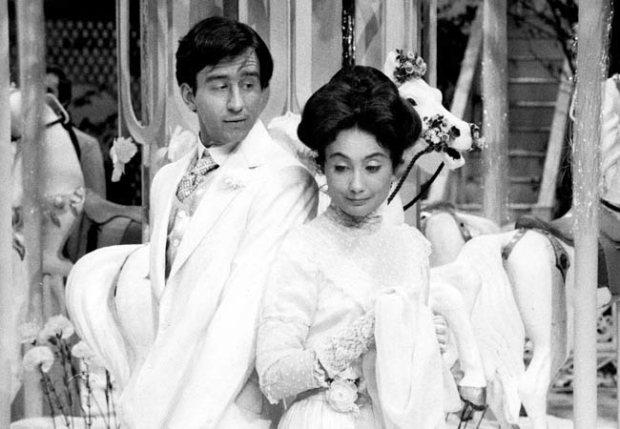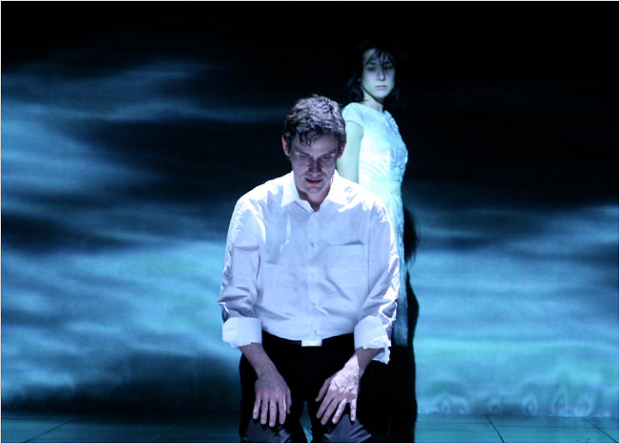Giving Will the Shakes (Part II)
This is part II of Michael Feingold's latest "Thinking About Theater" column. Click here to read part I.

Shakespeare was a man, not a god. He wrote plays in a specific time and for a specific purpose: to be performed by actors and enjoyed by audiences. He did this greatly, and the greatness of his reputation is well deserved, but we also have to remind ourselves constantly that his specificity was one reason for his huge success in his own time. His plays have the limitations, as well as the virtues, of his own sensibility, his troupe's needs, his audiences' tastes, and the thinking of his era.
Once you realize that Shakespeare's plays are not the arcane sacred texts of some religious cult, but simply plays, written to tell stories by showing what the people in those stories say and do while living through them, you have far less trouble comprehending them. That doesn't mean, however, that every word in a play by Shakespeare is, or should be, instantly comprehensible. In fact, it often means the reverse. Characters in plays are people in torment, or in a dilemma of some kind. They don't lay out their conflicting thoughts in the tidy sound-bite sentences of today's newscasters. Characters in plays never have done that, and never will; they demand more of our attention, which we give because their situation excites us. We want to understand them, and if the playwright has done his work as well as Shakespeare did, we will make the effort.
The challenge is made somewhat, but not all that much, tougher by the difference in context between Shakespeare's time and ours. He wrote for a culture in which images were not so readily reproduced as they are today; spoken words supplied a way of seeing, as well as of conveying sense. Additionally, he wrote for a wildly changing time (not unlike our own in that respect), when language was a principal medium of change, one that his audience loved to savor. He and his colleagues liked to coin words, to display new words, to pun on words and play sly games with them, to spin them into high extravagance. In that time, Virginia Woolf wrote memorably, it was "as if thought plunged into a sea of words and came up dripping."
The Oregon Shakespeare Festival wants to tame that sea of words, by commissioning playwrights to lay channels through it in the language of our own time. And they are to retain Shakespeare's scenes, characters, and events, while translating "only those lines that need translating." But those are, very often, just the lines that make people love Shakespeare.

(© CBS)
On the simplest level, some are nonsensical phrases that were never meant to be comprehended, like Feste's response in Twelfth Night while pocketing a tip, "I did impeticos thy gratillity." A step above that are the lines referring to Elizabethan customs, objects, or events. Again in Twelfth Night, how does a translator explain "cross-gartered"? And if you leave it unchanged, what sense does the rest of your altered diction make?
The quiet emendation of an archaic usage that gets in the way of audience comprehension is fairly easy; Shakespearean actors, directors, and dramaturgs have been practicing it discreetly for over a century without feeling the need to commission a "translator." Trouble really starts, though, on the highest level, where the great dramatic poetry that truly makes people love Shakespeare lives. Here, when you alter the words, you run the risk of destroying the music, and dramatic poetry without its music is simply dull, disjointed prose.
Music, we know, carries meanings that can't be expressed in words. Poetry, which is often said to aspire to the condition of music, attempts to have it both ways — to sculpt music out of words, those building blocks of meaning. Dramatic poetry, most audacious of all, strives to make the music of words express the feeling of a specific person in a particular situation.
Inevitably, such densely tangled expressions are hard to comprehend. The key point, which the literal-minded and academic often miss, is that Shakespeare, embodying these feelings in dramatic poetry, doesn't ask you to comprehend them, but to experience them through his characters. His audiences knew perfectly well that they weren't going to comprehend, in the literal sense, everything the actors said; while following the situation, they were going to receive the words, not parse them.
In this regard, George Bernard Shaw, although he has become notorious as a "Shakespeare hater" because of his willingness to point out what he viewed as shortcomings in Shakespeare's thought, turns out to have had the deepest love and understanding of Shakespeare as a dramatic poet. A rationalist who understood the major role the unconscious played in art, he had no patience with the literal-minded.
Shaw chose, as an instance of Shakespeare at his highest power, Cleopatra's lament on Antony's death:
O, wither'd is the garland of the war
The soldier's pole is fall'n: Young boys and girls
Are level now with men: The odds is gone
And there is nothing left remarkable
Beneath the visiting moon.
As Shaw rightly points out, "This is not good sense — not even good grammar." But he vehemently rebukes any actor who would attempt to speak the speech logically for its literal sense, because it has none. Its disconnected images, crammed together in such disorder, constitute a musical word-painting of Cleopatra's mind at this overwhelming moment. To shriek it out in overemotional disorder, failing to take account of its musical shape, would be, Shaw says, like singing Mozart out of tune. To impose some attempt at rationality on it, he suggests, would be like speaking the words of a Handel oratorio, repetitions and all.

(© Gerry Goodstein)
Had Shaw known about OSF's project, he would certainly have added that the attempt to "translate" a play containing such a speech would be absolutely futile. To translate the speech itself would destroy its musical and poetic value, along with its dramatic impact. To leave it alone, as being too famous and too significant to alter, while updating everything around it, would make it seem absurdly out of context, like a Renaissance sculpture stuck on a chrome-plated base in the middle of a high-tech room. And to attempt an explication of its images would result in a speech probably six times as long. The union of extravagance and compression is poetry's essence: the maximum of matter in the minimum of space.
That's why, however well OSF's commissions turn out, people will for the most part ignore them, and go on playing, reading, studying, and loving Shakespeare in his own words, with a minor emendation or footnote every so often to help them over a bumpy patch. (Even OSF itself has promised that its translations will be played parallel to, and not supplant, the original texts.) His plays pay huge dividends on the small amount of effort required, especially when blessed with the exceptional actors who can thrive within the music of his language, and bring its emotional sense to burning life. Exceptions though they be, there are many of them; the list I could make is too long for this essay.
The desire to translate Shakespeare comes from fear: Audiences go into the plays believing that they will not understand, that this exalted genius's work is too far above them. Actors and directors, far too often, likewise fall into the Shakespeare religion, "playing Shakespeare" — as if it were a special, remote style, like Kabuki — instead of simply playing a role in a play. Simplicity, straightforwardness, and common sense are the best tools for approaching Shakespeare, even at his most complex. When you come in fearlessly, armed with them, you get to enjoy the fun, the magic, the passion, the surprise, the excitement, the tragic power and the delight that are Shakespeare. Those who meet him only in "translation," with all his difficulties smoothed away and paved over, will never know those pleasures. As Shaw said, a century or so ago, "I pity the man who cannot enjoy Shakespeare." And today, regretfully, I pity OSF's theatergoers.
Michael Feingold's next two-part "Thinking About Theater" column will appear on consecutive Fridays November 20 and 27.
Michael Feingold has twice won the George Jean Nathan Award for Dramatic Criticism, most recently in 2015 for his "Thinking About Theater" columns on TheaterMania, and has twice been a finalist for the Pulitzer Prize in Criticism. He serves as chairman of the Obie Awards and has also worked as a playwright, translator, and dramaturg.











